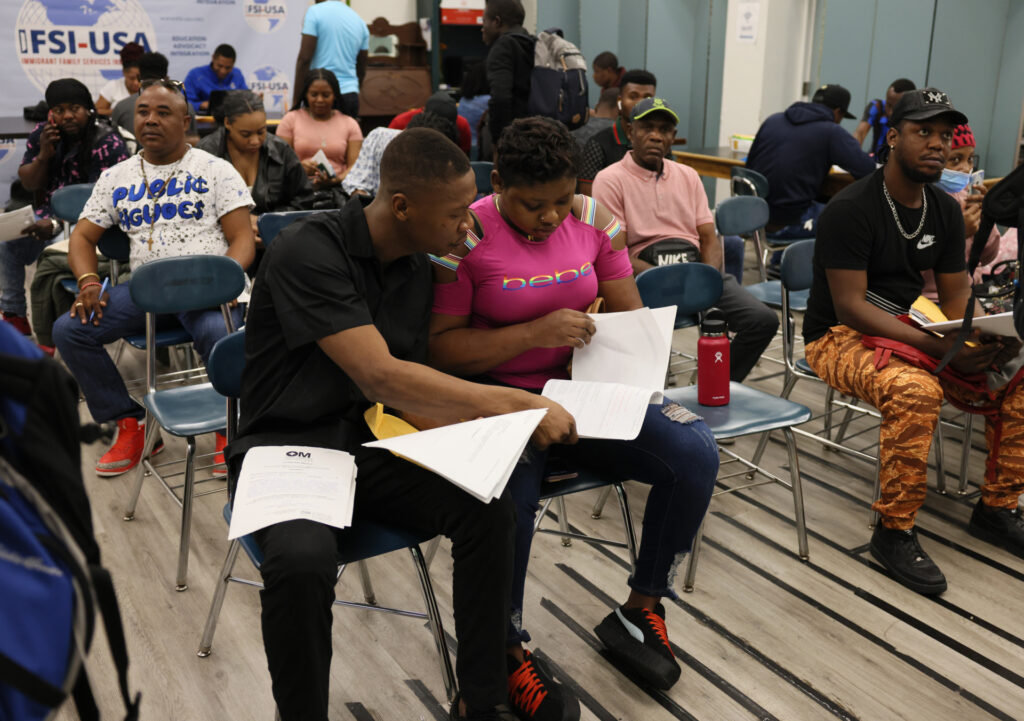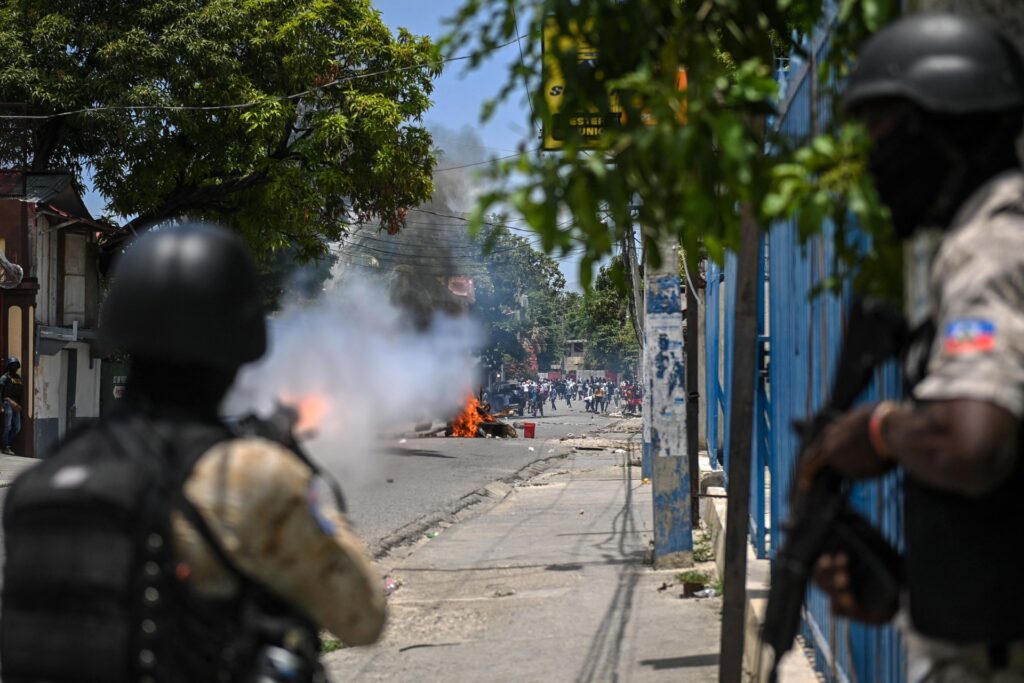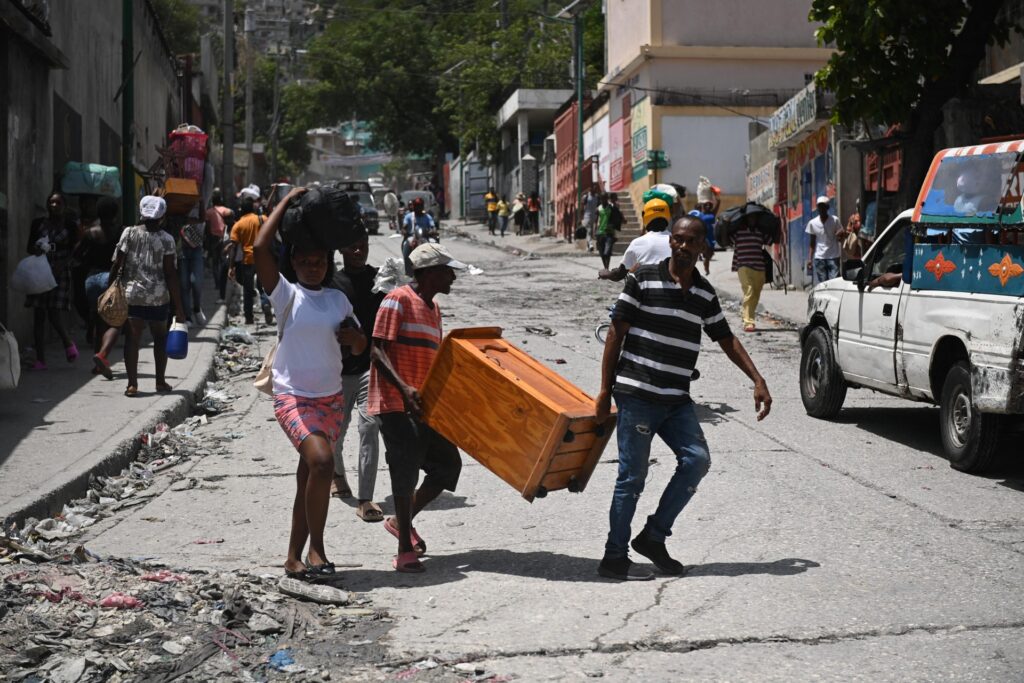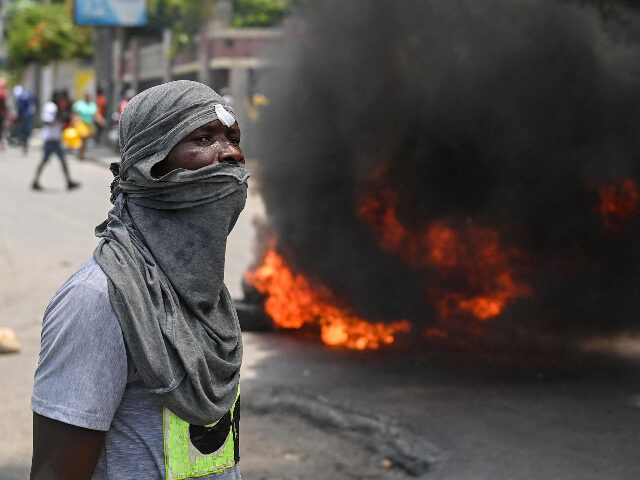President Joe Biden’s border chief has used a new visa program to quietly extract many police officers and local leaders from Haiti, leaving the rest of the country’s population abandoned in anarchy and gang wars.
Border Chief Alejandro Mayorkas established the Haitian visa program in January amid the anarchy accelerated by the failure of Haiti’s politicians to help elect a new president following the July 2021 murder of the country’s elected president. Each month, roughly 8,000 Haitians have been getting the visas, courtesy of Biden’s Cuban-born, pro-migration border chief, Mayorkas.
The visa has extracted many police officers as well as thousands of professionals and political leaders from Haiti.
The loss of cops may be the most destructive. “Almost 800 cops in Haiti have left the force in what the U.N. calls a ‘staggering loss,’” reads the September 2 headline in the Miami Herald. It continues:
The figure, 774 officers, was cited by United Nations Secretary-General António Guterres in a highly anticipated report that he sent to the U.N. Security Council last month on how the global agency could help Haiti’s U.S.-backed national police force quell the escalating violence.
[…]
the loss was caused by “resignations and post abandonment (with many officers leaving the country), dismissals, retirements, and fatalities in the line of duty.”
“A lot of police officers have left in the Biden [visa] program,” said Gary Victor, a Haitian writer who fled his home. “Haiti is a country that has no one governing it.”
Roughly 100 police have been killed in the last two years, and the police force is now down to about 3,300 officers instead of the claimed payroll of 14,000 officers.
Amid the growing chaos, there are signs that Mayorkas is rethinking his disaster, according to a September 10 tweet by Caribbean Correspondent Jacqueline Charles at the Miami Herald:
Lots of people in shock as @USEmbassyHaiti returns passports of individuals waiting for visas – without visas in them. #Haitians wondering what it means especially after waiting a year & now no idea what comes next. Meanwhile Carrefour under gang pressure.
— Jacqueline Charles (@Jacquiecharles) September 10, 2023
Establishment media frame Mayorkas’s policy as a humanitarian response to Haiti’s poverty.
But the media outlets are silent about Mayorkas’s role in the disaster.
They are also unwilling to recognize the Mayorkas policy as an especially destructive example of the federal government’s 40-year-old Extraction Migration policy that stimulates the consumer economy with waves of imported workers, consumers, and renters.
In Haiti, the visa program immediately caused a public rush to the exits of thousands of requests for visas a day, and by April, Mayorkas’s agency “was overseeing more than 580,000 pending cases for Haitians,” CBS News reported in May. Roughly 60,000 Haitians were pulled out in the first seven months.

Haitian migrants look over paperwork inside the Immigrant Families Services Institute in Boston, Massachusetts, as they wait to be connected with services like job opportunities and housing on May 8, 2023. (Jessica Rinaldi/The Boston Globe via Getty Images)
“Despair reaches such a level that the daughters and sons of the country only consider their future elsewhere,” said one top Haitian official, according to a New York Times March report.
Six weeks after the program started in January, Haiti Libre reported, “At least 20 Haitian police officers are already in the United States under the Biden Administration’s humanitarian conditional stay program.”
“So many Haiti National Police officers are applying to leave that the head of the immigration office last week announced a separate location just for officers and their families to drop off applications,” Jacqueline Charles wrote in February. She has extensively covered Biden’s simultaneous reluctance to send security forces against Haiti’s chaos and his support for the extraction program.
The Washington Post’s editorial board wrote on August 31:
Among the Haitian migrants who have sought refuge in the United States this year are Haitian police, a force badly outmatched and outgunned on the streets of Port-au-Prince. That exodus has accelerated the force’s depletion and incapacity. The police have proved so ineffective at reining in gang violence that in recent months vigilantes have taken it upon themselves to murder gang members in the street.
So it’s not just policemen or regular folks fleeing #Haiti via Biden humanitarian program. According to this post & others, it’s also officials. In this case interim mayor of Cayes Jacmel is also leaving Haiti under parole program. https://t.co/ovQ4ze7498
— Jacqueline Charles (@Jacquiecharles) February 18, 2023
The U.S. closed its embassy in Haiti on August 8 amid the expanding wave of gang fights, kidnappings, neighborhood shootings, and public pleas for police protection.
“There have been multiple lynchings here in 2023,” U.S. author and Haitian resident Mitch Albom wrote on September 3 in the Detroit Free Press. “That word alone is enough to spark outrage and action in America.”
We are the World
One Love, One HeartPlease help the Country of Haiti
Gangsters are taking over, killing the innocent
So much BloodshedTo do something about the violence there
Greatness Reached over Oppression through WisdomHelp them GROW pic.twitter.com/zm85pZcHyk
— AQueenJacqueline Jimoh GROW (@GROWMOVEMENT2U) September 10, 2023
The two-sided role of Biden’s policy is widely recognized by Haitian expatriates.
The parole “program is creating the worst brain drain ever,” said Marleine Bastien, a Haitian activist and elected member of the Miami-Dade County Commission. She spoke in February, just after the visa program began.
The Miami Herald reported the dilemma in January:
Haitian leaders also say the program further opens the door to a brain drain of professionals and others, raising questions about who will rebuild the country.
Others have emphasized the need for the United States to work with Haitian civil society to create the necessary political, social and economic conditions for Haitians to stay in the country.
“We welcome everything that is good for the community. We believe that it provides a sense of relief, but it is not a solution,” said Father Reginald Jean-Mary. “It is important for the Biden-Harris administration to understand that the root cause of the problem is what’s happening in Haiti.”
Neither Mayorkas nor other Biden officials have publicly acknowledged the disastrous effects of the policy on Haitian public security. Vice-Preisdent Kamala Harris has also dodged the issue despite her “border czar” title.

Police officers throw tear gas at demonstrators during a protest against insecurity in Carrefour-Feuilles, a district of Port-au-Prince, Haiti, on August 14, 2023. (RICHARD PIERRIN/AFP via Getty Images)
The Mayorkas visa program extracts 30,000 migrants per month from Haiti, Cuba, Nicaragua, and Venezuela without any authorization from Congress. The business-backed program provides legal status, a work permit to illegal migrants, and the hope of life in America for the migrants and all of their descendants.
The program uses non-government sponsors and groups, such as the corporate-backed Welcome.US non-profit, to welcome and help the migrants without direct funding from Congress. The FWD.us advocacy group for West Coast investors has acted as a cheerleader for the program, while investor-funded non-profits use lawsuits to expand the program.
Still, few of the poorest Haitians can afford to enter the Biden visa program, Woy Magazine reported in June:
The first challenge is finding a sponsor. The program requires sponsors to be either a U.S. citizen, a legal permanent resident or have temporary protected status with proof of income. The sponsor doesn’t need to be related to the applicant.
…
The Office of Citizens’ Protection has also criticized the “inaccessibility and inefficiency” of the passport process, which it said opened the way “for all sorts of exploitation, extortion, and blackmail.” And it acknowledged that police officers and passport officials are charging people more than the official prices for passports.
Yet the incentives to exit Haiti are great. For example, the Haitian Times reported, “When the United States rolled out the humanitarian parole process for Haitians last January, one man, ‘Bobo,’ received approval to travel to Boston within a week. Now, the 29-year-old works for Amazon.”
Woy Magazine reported on another applicant, Andre Samedi, who entered the United States on March 22 after his U.S-based brother sponsored him:
Samedi joined them on March 22, after applying for the humanitarian parole program in early January. He was welcomed by his brother, who sponsored his application, and felt grateful for a newfound sense of safety.
“I am happy to be in the U.S. because I have many family members here who had left and couldn’t return to visit because of the difficulties at home,” he says.
Mayorkas also admits additional Haitian migrants via other channels. For example, Mayorkas accepts many Haitian migrants who cross the Mexican border despite his January promise to deport Haitians who do not hold a Biden visa.
SHOCK VIDEO: Nearly 400 People Rescued from “Unsafe, Overloaded” Haitian Sailboat
U.S. Coast Guard District 7A report funded by the Ford Foundation in the Haitian Times profiled a group of seven medical students:
INDIANAPOLIS — Years ago at the Université Quisqueya medical school in Port-au-Prince, a group of seven students formed a bond of friendship that saw them through graduation, the start of their careers as doctors and other milestones, including immigrating to America. Now, members of the seven are, or were initially, living in this Midwest city of an estimated 880,621 residents.
…
“We want to feel free, to feel comfortable, [so we live] with friends,” said Joseph, who asked to use a pseudonym to not jeopardize his employment prospects. “My roommate and I, we met a lot of others [in Indianapolis] who are from Haiti or from our medical school. We have a lot of young people here.”
Mayorkas has also extended the Temporary Protected Status (TPS) program to Haitians who arrive illegally, allowing them to work and settle in the United States, mostly in Florida and New York. One TPS beneficiary was profiled in the Haitian Times:
MIAMI – Dayana once dreamt of becoming a lawyer in Haiti. But in the summer of 2021, after Haitian President Jovenel Moïse was assassinated in his bedroom and a law mentor of hers was shot dead in his car, Dayana knew she needed to safeguard her future, her life. Shortly after graduating from law school, Dayana took a flight to Florida on a tourist visa, with no plan to return to Haiti.
…
In December 2022, the Biden Administration expanded Temporary Protected Status (TPS) to more than 100,000 Haitians who had arrived in the U.S. by Nov. 6, 2022. Dayana applied.
Even before receiving an answer, the possibility of receiving the [TPS] legal status lifted a weight off Dayana. “I feel like I’m free,” she said. “Free.”
Biden and his deputies have resisted pressure from Canada and the United Nations to send a nation-building force into Haiti since its president was assassinated while sleeping in his home in July 2021. Haiti has not had a chief executive since.
The refusal to send security forces to Haiti is politically understandable for a president already supporting a war with Russia in the run-up to the 2024 election. But the refusal has left Haitians without much foreign support to restore their government — and it almost guarantees many future waves of migrants from Haiti.

Residents evacuate the Carrefour Feuilles commune in Port-au-Prince, Haiti, on August 15, 2023, as gang violence continues to plague the Haitian capital. (RICHARD PIERRIN/AFP via Getty Images)
Many countries have given up on Haiti’s ability to modernize itself. For example, the General Secretariat on Haiti of the Organization of American States, where the U.S. plays a dominant role, suggested in August 2022 that the international community should give up any hope of stabilizing Haiti. Instead, the secretariat said nations could treat Haiti as an endless source of uneducated migrant labor, consumers, and renters:
The international community, international financial institutions, the multilateral system, and the international financial community of donor countries must make a decision: whether they want to industrialize Haiti sufficiently to ensure work for nine million Haitians, or whether it is economically more profitable to continue absorbing Haitian migrants [emphasis added] and let host countries accommodate them as and how they can and in such economic conditions as they can offer.
In late 2021, Mayorkas flew thousands of Haitian illegals straight back to Haiti to calm the political uproar caused by Mexico’s decision to steer up to 30,000 Haitian migrants into the Del Rio bridgehead in Texas. The Mayorkas airlift even returned Haitian migrants who had migrated from settled homes in Chile and other South American nations.
Mayorkas conducted the airlift even though he has repeatedly claimed to be a champion of “equity” for migrants.
WATCH: Haitian Migrants Continue To Stream Across Rio Grande To Del Rio
Randy ClarkMayorkas is a pro-migration zealot who has said his border management is “all about achieving equity, which is really the core founding principle of our country.” Mayorkas’s demands imply equity between U.S. citizens and foreign citizens, and he has opened many loopholes for millions of economic migrants to cross into American society.
Despite his comments about equity, Mayorkas has not mentioned the damaging impact of his policy on the left-behind people in Haiti, Venezuela, Cuba, or other countries.
Footage posted by gangs in #Haiti to show their power on social media by terrorizing people in the community of Delmas 24, only shows their fear & weakness. They cannot win by inciting foreign intervention through violence. RESISTANCE is the watchword 4 true sovereignty. pic.twitter.com/U0HPvQyiGg
— HaitiInfoProj (@HaitiInfoProj) September 12, 2023
Extraction Migration
The federal government has long operated an unpopular economic policy of Extraction Migration. This colonialism-like policy extracts vast amounts of human resources from needy countries, reduces beneficial trade, and uses the imported workers, renters, and consumers to grow Wall Street and the economy.
The migrant inflow has successfully forced down Americans’ wages and boosted rents and housing prices. The inflow has also pushed many native-born Americans out of careers in a wide variety of business sectors and contributed to the rising death rate of poor Americans.
The lethal policy sucks jobs and wealth from heartland states by subsidizing coastal investors with a flood of low-wage workers, high-occupancy renters, and government-aided consumers.
The population inflow further reduces the political clout of native-born Americans because the population replacement allows elites and the establishment to divorce themselves from the needs and interests of ordinary Americans.
In many speeches, Mayorkas has said he is building a mass migration system to deliver workers to wealthy employers and investors and “equity” to poor foreigners. The nation’s border laws are subordinate to elite opinion about “the values of our country,” Mayorkas claims.
Migration — and especially labor migration — is unpopular among swing voters. A 54 percent majority of Americans say Biden is allowing a southern border invasion, according to an August 2022 poll commissioned by the left-of-center National Public Radio (NPR). The 54 percent “invasion” majority included 76 percent of Republicans, 46 percent of independents, and even 40 percent of Democrats.

COMMENTS
Please let us know if you're having issues with commenting.